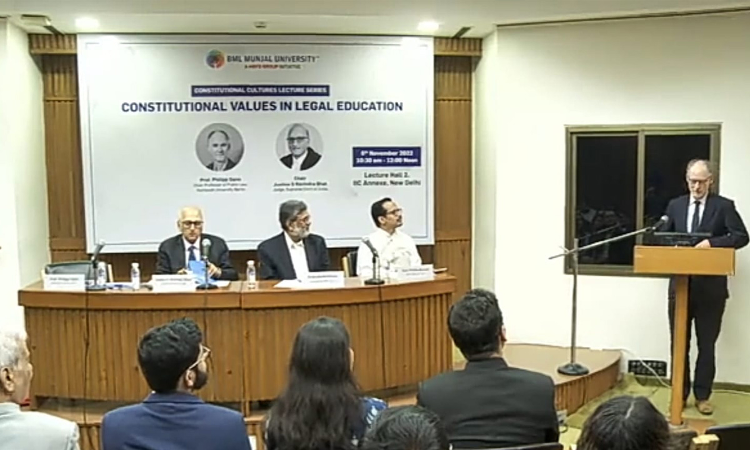Constitutions Have To Be Understood In The Context Of The People Who Matter For It: Justice Ravindra Bhat
LIVELAW NEWS NETWORK
7 Nov 2022 1:45 PM IST

The BML Munjal University (hereinafter referred to as 'BMU') organised its maiden lecture as part of the "Constitutional Culture Lecture Series" at the India International Centre here in New Delhi on the 6th of November 2022. The theme for the first lecture was "Constitutional Values in Legal Education".
The Speaker for the session was Prof. Philipp Dann, Chair of Public Law, Humboldt University Berlin. The Chair for the session was Hon'ble Justice S Ravindra Bhat, Judge Supreme Court of India. The Moderator for the session was Prof. Pritam Baruah, Dean - School of Law, BML Munjal University and the Guest was Prof. Shyam Menon, Vice-Chancellor, BML Munjal University.
Prof. Shyam Menon delivered the welcome address by stating how India, despite being an old civilisation, is a young republic and so it is natural for it to go through difficult and turbulent times. He went on to state that, it is during these difficult times that the Constitution and the values it enshrines keep us on our course towards our chosen destiny. He also stated that the lecture series being organised by BMU was a tribute to the city of Delhi and a contribution to its intellectual life.
The welcome address was followed by Hon'ble Justice Ravindra Bhat's introductory remarks. Justice Bhat started off by praising BMU for conceiving a public lecture series on inculcating constitutional values in legal education. He further said "I am a bit nostalgic. We had amidst us stalwarts as legal academics who were … the best. Succeeding generations were not as fortunate. But, what you are trying to achieve through this lecture series is beyond personalities. You are trying to locate the value of constitutionalism in legal education."
Justice Bhat also spoke about how a study of Constitution and Constitutionalism should be carried out in law schools. He said "As I understand it, legal education, the way we were taught, was divorced from interdisciplinary aspects which are so necessary to understand the constitution. Because constitutions have to be understood in the context of the people who matter for it. It is not just a legal document. It is not just a law. It is much more than that. It outlines the charter of governance. It outlines your liberties and enriches the content of citizens' lives.
Speaking on the importance of Legal Education, Justice Bhat remarked "In order to sustain constitutionalism there has to be a constant movement in society to inculcate its values and that is where there is centrality to legal education … So I think there is a need to iterate this and reiterate this time and again if you have to inculcate this idea of constitutionalism in our society. The building block for this society has to be lawyers, budding lawyers, law students who will carry with them. They have a greater responsibility, far more than informed citizens given the way we have chosen and written our constitution. Our constitution is a people-centric constitution. It strives to achieve a certain level of value system."
Prof. Philipp Dann delivered the lecture for the session on Constitutional Values in Legal Education. His lecture was divided into three main parts.
Firstly, he explored whether legal education has any relevance in protecting the constitutional way of life, constitutional values and constitutionalism. He argued that legal education might not be the first aspect that comes to mind in this regard, however there is great scope for it to build constitutional resilience for atleast two reasons. One, You need good lawyers to run institutions and instill respect and a certain understanding of the Constitution and its values in them. Two, you need a legal profession that is able to explain to new generations in new situations facing new challenges and conflicts what to expect from the Constitution and what not and why it is useful to have and defend these constitutional bases.
Secondly, He tried to characterise the nature of law and lawyering in order to find a path to adequate understanding of teaching law. He argued that teaching law is different from teaching other subjects and domains such as engineering, etc. He said that this distinction needs to be taken into account while teaching law.
Thirdly, he outlined two models of teaching law - open and plural vs. closed and instrumental. He argued that we have to find ways to teach through the open and plural model as opposed to the closed and instrumental one in order to foster constitutional resilience. Explaining this further, Prof. Dann said that we need to understand that access to legal education should be made available to all and our classrooms should not be restricted to an elite few but should mirror the complexity and plurality of the society we live in. Our teaching methods should also reflect this complexity and it should be dialogical rather than monological.
Prof. Dann's lecture was followed by a Question and Answer session. At the end, Hon'ble Justice Bhat gave his concluding remarks as the Chair of the session. He pointed out the need to inculcate constitutional values among citizens by incorporating them in school curriculums. He said this would ensure an aware and enriched citizenry. He also talked of the importance of interdisciplinary study and the need to do a deeper study of various constitutional institutions in this country.
Prof. M.P. Singh also spoke at the end of the session. He lamented on the kind of legal education being imparted to students currently in law schools which is rather inaccessible as compared to the kind of legal education that was imparted during the time when he was a student. He said the quality of legal education has also seen a tremendous shift and it has only been so for the worse.
The session ended with a formal vote of thanks by Prof. Pritam Baruah.


